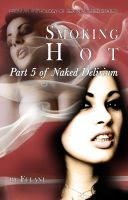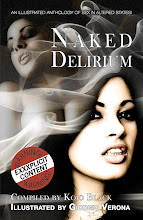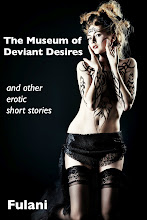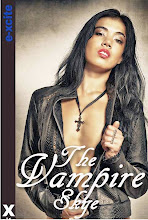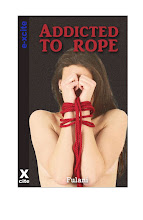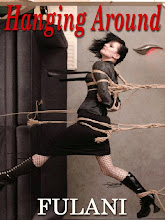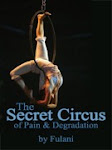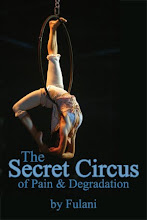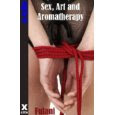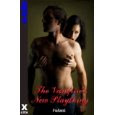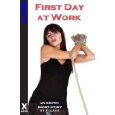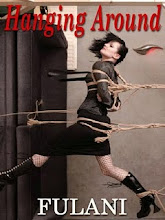Two new things to report.
First: story out in a new Xcite anthology. The Cocktales e-book series, book is Kiss in the Dark and my story is 'Zen and the Art of Bondage'.
Blurb - When is an orgasm a work of art? When it’s the result of Japanese bondage, of course! Miranda works in a bookshop and when one of her customers keeps buying books on Japanese culture, she quizzes him about his interest. This takes her on a journey from ikebana, Japanese flower arranging, all the way to shibari, Japanese bondage. She discovers the best sex toy you can have is a length of rope...
Obviously I kind of prefer my story but seriously, I'd recommend them all.
As always, using the affiliate link at the side of this page (and buying stuff, whether it's mine or not) puts some fractions of a penny in my bank account.
Second: my first NOVEL is out, published by Pink Flamingoin the US. Title is The Secret Circus of Pain and Degradation - print and ebook versions.
Blurb - “The Secret Circus of Pain and Degradation, an entertainment for those with enquiring minds”… Amy and Paula, living in a small and small-minded town, are too curious to stay away. But when the ringmaster displays his talent for hypnotism, they discover that what they’d always wanted to do was run away and join a circus.
They are inducted as professional, performing submissives into the S&M world of the circus folk, including being made available for discreet private functions. They experience the depths, and ecstacies, of decadence and depravity.
Ultimately Paula is captured by a mad private client; Amy mobilizes the circus to save her.
Meanwhile, the traveling circus is planning an offshoot—a circus-like fetish club. Amy and Paula, now fully inducted into a fetish lifestyle, become its managers as well as star performers.
Have fun! I'm just about to start the next novel...
Saturday 29 May 2010
Thursday 20 May 2010
Personal influences - random stuff
I've been neglecting this blog for a few days while I've been sorting out real-life stuff, mine and other people's. Some of it involves sorting out medical advice and attention for other people (getting them to appointments and such). Some of it involves the kinds of work I get to be able to invoice people for. And some of it is just following my own nose and thinking about types of fiction writing that don't involve, or at least only indirectly involve, erotica.
Be that as it may, I thought I'd round off the introspective theme about 'where has my intellectual interest in erotica come from' by just making some lists. And here they are.
Psychoanalysis - Freud's 'Totem and Taboo' and Jung's book on symbols. Different themes here, but some are to do with the idea of narrative - making sense of the world, in some ways actually creating our world, through the stories we tell ourselves and the ways in which certain mental images seem to operate as ways of understanding meanings that underlie and influence the everyday.
Allied to this, the deliberate playing with language and image in dada and surrealism. What was it about lobsters?
Anais Nin's writing - her diaries and short short stories. I remember vivid and erotic descriptions of the train from Paris to Louveciennes, the description of a woman having her public hair shaved, her descriptions of her own house and garden and how they were invested with meanings for her, the line about a woman who always looked like a fire engine... strange collection of images I know. Writing it down some of it doesn't sound remotely like it should be erotic at all, but that was the reaction I had when I read her work.
Films – 'Cat People' (the bondage scene of course). 'Maitresse' and 'Loulou' (both with Gerard Depardieu who always seemed to exude a kind of sexiness I always wanted to emulate but never did, and Bulle Ogier in Maitresse and Isabelle Huppert in Loulou...). The very mannered 'Diva' - not because of the plot or characters but somehow just the way it was shot. The weird and darkly violent 'Themroc' and 'Bof' - early 70s films, the former still around on VHS and the latter now only a trace in French film databases, with no VHS or DVD release I can find. What is it with French cinema where even someone walking to shops looks charged with sexuality? Then 'WR mysteries of the organism', wonderfully anarchic. Some of Warhol's films - one involved a bdsm scene taking place in a cheap hotel somewhere between about four women- might have been 'Chelsea Girls' but I can't be certain... at any rate most of that film is shot in split-screen and I don't remember the scene that way.
Thinking about it, many of the influences I've found 'erotic' over the years, or made me delve more in the psycho-social aspects of eroticism, weren't in themselves about erotic subjects as such. They were - like the Warhol films - about people on the fringes of society just trying to get by, people who in some respects were seen as freaks by others and identified as freaks themselves, and for whom certain kinds of deviance weren't even exciting or exotic but just 'came with the territory'. Or they were odd, random images that seemed to make some kind of unconscious connection I can't even begin to define. What, exactly, about Dali's lobster telephone or Duchamp's large glass ('The Bride Stripped Bare By Her Batchelors, Even' - which depicts components of a coffee grinder among other things) triggered an erotic response in me? Some influences are maybe more obvious - an old cover of an SF magazine, probably 'Analog', with a picture of an alien wild slave female in chains on the cover... but lobsters and coffee grinders?
Other stuff - Robert Shea/Robert Anton Wilson, the Illuminatus trilogy (which is every bit as random as Pynchon or some surrealist authors) had various scenes that were sexy in a strange way. Similarly, Michael Moorcock's Cornelius Quartet of novels, with their odd mix of 'Britishness' and offhand treatment of sexual themes, got to me.
And finally - Lenny Bruce. the comedian who worked strip joints for much of his career, used his words to battle for attention when all the punters really wanted to do was look at the strippers, and who wanted to know why it was ok to show people killing and maiming each other on film but not to show people enjoying sex.
As I said, it's a random list.
Have fun!
Be that as it may, I thought I'd round off the introspective theme about 'where has my intellectual interest in erotica come from' by just making some lists. And here they are.
Psychoanalysis - Freud's 'Totem and Taboo' and Jung's book on symbols. Different themes here, but some are to do with the idea of narrative - making sense of the world, in some ways actually creating our world, through the stories we tell ourselves and the ways in which certain mental images seem to operate as ways of understanding meanings that underlie and influence the everyday.
Allied to this, the deliberate playing with language and image in dada and surrealism. What was it about lobsters?
Anais Nin's writing - her diaries and short short stories. I remember vivid and erotic descriptions of the train from Paris to Louveciennes, the description of a woman having her public hair shaved, her descriptions of her own house and garden and how they were invested with meanings for her, the line about a woman who always looked like a fire engine... strange collection of images I know. Writing it down some of it doesn't sound remotely like it should be erotic at all, but that was the reaction I had when I read her work.
Films – 'Cat People' (the bondage scene of course). 'Maitresse' and 'Loulou' (both with Gerard Depardieu who always seemed to exude a kind of sexiness I always wanted to emulate but never did, and Bulle Ogier in Maitresse and Isabelle Huppert in Loulou...). The very mannered 'Diva' - not because of the plot or characters but somehow just the way it was shot. The weird and darkly violent 'Themroc' and 'Bof' - early 70s films, the former still around on VHS and the latter now only a trace in French film databases, with no VHS or DVD release I can find. What is it with French cinema where even someone walking to shops looks charged with sexuality? Then 'WR mysteries of the organism', wonderfully anarchic. Some of Warhol's films - one involved a bdsm scene taking place in a cheap hotel somewhere between about four women- might have been 'Chelsea Girls' but I can't be certain... at any rate most of that film is shot in split-screen and I don't remember the scene that way.
Thinking about it, many of the influences I've found 'erotic' over the years, or made me delve more in the psycho-social aspects of eroticism, weren't in themselves about erotic subjects as such. They were - like the Warhol films - about people on the fringes of society just trying to get by, people who in some respects were seen as freaks by others and identified as freaks themselves, and for whom certain kinds of deviance weren't even exciting or exotic but just 'came with the territory'. Or they were odd, random images that seemed to make some kind of unconscious connection I can't even begin to define. What, exactly, about Dali's lobster telephone or Duchamp's large glass ('The Bride Stripped Bare By Her Batchelors, Even' - which depicts components of a coffee grinder among other things) triggered an erotic response in me? Some influences are maybe more obvious - an old cover of an SF magazine, probably 'Analog', with a picture of an alien wild slave female in chains on the cover... but lobsters and coffee grinders?
Other stuff - Robert Shea/Robert Anton Wilson, the Illuminatus trilogy (which is every bit as random as Pynchon or some surrealist authors) had various scenes that were sexy in a strange way. Similarly, Michael Moorcock's Cornelius Quartet of novels, with their odd mix of 'Britishness' and offhand treatment of sexual themes, got to me.
And finally - Lenny Bruce. the comedian who worked strip joints for much of his career, used his words to battle for attention when all the punters really wanted to do was look at the strippers, and who wanted to know why it was ok to show people killing and maiming each other on film but not to show people enjoying sex.
As I said, it's a random list.
Have fun!
Labels:
adult theme,
Anais Nin,
Dali,
Duchanp,
erotica,
fetish,
French cinema,
Freud,
Illuminatus,
Jung,
Lenny Bruce,
Loulou,
Maitresse,
Moorcock,
psychology,
taboo,
Warhol
Wednesday 12 May 2010
A day of distractions
Many distractions: taking someone to the doctor, phone conversations, writing up some notes based on those conversations, and feeling that much of what's happened, what I've seen/read/heard could, one way or another, form either the basis for a plot or elements of a story.
I woke up at 4.26am with one word from a dream - 'incandescent'. Who knows? But it would fit well with a scene I'm about to write which takes place in a candle-lit setting.
Read a bit of 'Freakonomics' (the economics book by Steven Levitt). He doesn't address this question but it popped into my mind: how can one monetise being a freak in today's postmodern, media-rich society? Is it a case of being a media whore and grabbing your 15 minutes of fame, followed by repeated exposure as other media companies home in on you? Or are we all freaks now?
Exorcised some of my surrealist tendencies (see the previous blog) by replying to someone else's blog in the form of a few sentences of surreal flash fiction. But I still want to pursue the idea of surrealist erotica when time allows...
Read a bit of an Umberto Eco essay that set up an idea in my mind for a voodoo-related story. It may get written but I have a dozen other things I want to write first, and two I want to re-write before I think they're publishable.
Also I've noticed a local writing group which runs monthly readings is inviting submissions for June on a theme of 'taboo'. I know about taboos, right, because I write bdsm? Well, yes, but I've just been consulting Freud's 'Totem and Taboo' and thinking about what I might want to contribute. Nothing I have 'in stock' would work. But do I really want to write a story about incest or cannibalism or necrophilia? Not really... well, maybe cannibalism. I'm still mulling that one over.
Think I'd better get back to the things I'm trying to finish or rewrite at the moment before starting anything new.
Ah well. So it goes.
(And even that's a quote - a character in a Kurt Vonnegut story I think!)
I woke up at 4.26am with one word from a dream - 'incandescent'. Who knows? But it would fit well with a scene I'm about to write which takes place in a candle-lit setting.
Read a bit of 'Freakonomics' (the economics book by Steven Levitt). He doesn't address this question but it popped into my mind: how can one monetise being a freak in today's postmodern, media-rich society? Is it a case of being a media whore and grabbing your 15 minutes of fame, followed by repeated exposure as other media companies home in on you? Or are we all freaks now?
Exorcised some of my surrealist tendencies (see the previous blog) by replying to someone else's blog in the form of a few sentences of surreal flash fiction. But I still want to pursue the idea of surrealist erotica when time allows...
Read a bit of an Umberto Eco essay that set up an idea in my mind for a voodoo-related story. It may get written but I have a dozen other things I want to write first, and two I want to re-write before I think they're publishable.
Also I've noticed a local writing group which runs monthly readings is inviting submissions for June on a theme of 'taboo'. I know about taboos, right, because I write bdsm? Well, yes, but I've just been consulting Freud's 'Totem and Taboo' and thinking about what I might want to contribute. Nothing I have 'in stock' would work. But do I really want to write a story about incest or cannibalism or necrophilia? Not really... well, maybe cannibalism. I'm still mulling that one over.
Think I'd better get back to the things I'm trying to finish or rewrite at the moment before starting anything new.
Ah well. So it goes.
(And even that's a quote - a character in a Kurt Vonnegut story I think!)
Monday 10 May 2010
Feeling accomplished...
New story now out with Xcite as an individual e-book: 'First Day at Work'.
The blurb goes like this: Linzi’s first day at work isn’t quite what she expected. For one thing, part of the warehouse stock is sex toys. For another, the other woman in the office has a very intimate relationship with the manager and the warehouse man. When it turns out they’ll be staying on to receive a late delivery, Linzi finds out that much more than work goes on in her new workplace. And that means she’ll fit right in… 5000 words or thereabouts.
As always, using the link on the right, which is an affiliate link, puts some fraction of a penny in my bank account if you do actually buy anything...
Currently working on a couple of projects, one a series of half a dozen linked stories with the same characters in each one; another a slightly science-fictionish erotic novella or novel (not sure which yet) that's involving me in trying to find out some technical stuff about fabric design, e.g. the development of electronic circuits that can be made to fit in a single strand of fibre - my understanding is this is now technically feasible but some way off commercial production. Watch this space!
Oh, and I've been looking again at books like BS Johnson's 'Albert Angelo' - a surrealist novel - with an eye to whether surrealist erotica might be a possibility! I probably also need to find my copies of old Alfred Jarry and Boris Vian novels to remind myself what they did.
The blurb goes like this: Linzi’s first day at work isn’t quite what she expected. For one thing, part of the warehouse stock is sex toys. For another, the other woman in the office has a very intimate relationship with the manager and the warehouse man. When it turns out they’ll be staying on to receive a late delivery, Linzi finds out that much more than work goes on in her new workplace. And that means she’ll fit right in… 5000 words or thereabouts.
As always, using the link on the right, which is an affiliate link, puts some fraction of a penny in my bank account if you do actually buy anything...
Currently working on a couple of projects, one a series of half a dozen linked stories with the same characters in each one; another a slightly science-fictionish erotic novella or novel (not sure which yet) that's involving me in trying to find out some technical stuff about fabric design, e.g. the development of electronic circuits that can be made to fit in a single strand of fibre - my understanding is this is now technically feasible but some way off commercial production. Watch this space!
Oh, and I've been looking again at books like BS Johnson's 'Albert Angelo' - a surrealist novel - with an eye to whether surrealist erotica might be a possibility! I probably also need to find my copies of old Alfred Jarry and Boris Vian novels to remind myself what they did.
Labels:
adult theme,
bdsm,
bondage,
erotic name,
erotica,
fiction,
writing,
Xcite,
Xcite books
Sunday 9 May 2010
Fictional influences part 3
A third major influence on me was Thomas Pynchon's Gravity's Rainbow (1973).
The term is a metaphorical term for (though not a literal description of) to the trajectory of rockets, in this case V2 rockets launched by the Germans at London in the latter stages of World War 2. This was the first point in history that missiles arrived faster than sound, so the first you knew about the V2 was the explosion – the sound of its arrival followed afterwards. I remember this idea of the bang coming before the sound of its arrival being a motif at various points in the novel but maybe that's a false memory...
It's a huge sprawl of a novel with over 400 characters (I haven't counted but Wikipedia says so) and a complex interweaving of different narrative threads, dreamlie/druglike sequences and descriptive sections that often relate to highly technical aspects of rocket design and launch. The ostensible plot can be roughly summarised as a search for a mysterious device that may or may not have existed and may or may not have been intended to be installed in V2 serial number 00000. The purpose of the device is unknown, but there are some clues, or maybe they're not clues, about its magical, numerological, Tarot, sexual, and other significances. In the early part of the novel there is an American soldier based in London who, if I remember aright, gets an erection when he is at any location where a V2 will later land. Do the erections predict the V2 targets or somehow precipitate them?
The book has a whole lot of bawdy and deviant sex in it, but it's treated very much as a normal part of life for people living in a fucked-up world (this is World War 2, remember). Mostly, the characters don't know if they're going to be alive this time tomorrow and, if they're soldiers, are often in situations where sex is not a realistic possibility (though they frequently remember, recount, fantasise etc.); or are in situations where sex is routine (brothels, women bartering a fuck for some food or a pair of stockings); or where sexual fantasy and fetishism is a way of dealing with the strangeness of the world. In particular I remember a scene in which an actress (Margehrita) persuades one of the other characters (Slothrop) to re-enact an S&M scene with her in an old movie lot; the scene was one she'd played in a Nazi film years before. On another occasion, she (or maybe one of the other women, I haven't checked!) tantalise Slothrop by going out for days at a time to engage in kinky sex with military police, returning home expecting to be punished for it.
There's a lot of by-play with language, incidentally. In the Soviet sector, one of the characters - who had previously been a spy of sorts - re-emerges as the member of a committee for the development of a Turkic alphabet, with special responsibilities for a letter that doesn't exist or have a parallel in the English language...
To be quite honest I don't think I can summarise any 'lessons' I learned from this book, other than that it was a wonderful read and stuffed full of highly inventive stuff that kept me reading. One description of the book is a 'Disney-meets-Bosch panorama of European politics, American entropy, industrial history, and libidinal panic which leaves a chaotic whirl of fractal patterns in the reader's mind'. Sounds fair to me.
I've had a go at his first novel, V, but found it harder going; ditto The Crying of Lot 49. He's published other books since and I want to try Against the Day, which Pynchon said he set in 'a time of unrestrained corporate greed, false religiosity, moronic fecklessness, and evil intent in high places. No reference to the present day is intended or should be inferred.' Oh yeah? Come to think of it, that's pretty much the world I'm planning to set my next novel in...
The term is a metaphorical term for (though not a literal description of) to the trajectory of rockets, in this case V2 rockets launched by the Germans at London in the latter stages of World War 2. This was the first point in history that missiles arrived faster than sound, so the first you knew about the V2 was the explosion – the sound of its arrival followed afterwards. I remember this idea of the bang coming before the sound of its arrival being a motif at various points in the novel but maybe that's a false memory...
It's a huge sprawl of a novel with over 400 characters (I haven't counted but Wikipedia says so) and a complex interweaving of different narrative threads, dreamlie/druglike sequences and descriptive sections that often relate to highly technical aspects of rocket design and launch. The ostensible plot can be roughly summarised as a search for a mysterious device that may or may not have existed and may or may not have been intended to be installed in V2 serial number 00000. The purpose of the device is unknown, but there are some clues, or maybe they're not clues, about its magical, numerological, Tarot, sexual, and other significances. In the early part of the novel there is an American soldier based in London who, if I remember aright, gets an erection when he is at any location where a V2 will later land. Do the erections predict the V2 targets or somehow precipitate them?
The book has a whole lot of bawdy and deviant sex in it, but it's treated very much as a normal part of life for people living in a fucked-up world (this is World War 2, remember). Mostly, the characters don't know if they're going to be alive this time tomorrow and, if they're soldiers, are often in situations where sex is not a realistic possibility (though they frequently remember, recount, fantasise etc.); or are in situations where sex is routine (brothels, women bartering a fuck for some food or a pair of stockings); or where sexual fantasy and fetishism is a way of dealing with the strangeness of the world. In particular I remember a scene in which an actress (Margehrita) persuades one of the other characters (Slothrop) to re-enact an S&M scene with her in an old movie lot; the scene was one she'd played in a Nazi film years before. On another occasion, she (or maybe one of the other women, I haven't checked!) tantalise Slothrop by going out for days at a time to engage in kinky sex with military police, returning home expecting to be punished for it.
There's a lot of by-play with language, incidentally. In the Soviet sector, one of the characters - who had previously been a spy of sorts - re-emerges as the member of a committee for the development of a Turkic alphabet, with special responsibilities for a letter that doesn't exist or have a parallel in the English language...
To be quite honest I don't think I can summarise any 'lessons' I learned from this book, other than that it was a wonderful read and stuffed full of highly inventive stuff that kept me reading. One description of the book is a 'Disney-meets-Bosch panorama of European politics, American entropy, industrial history, and libidinal panic which leaves a chaotic whirl of fractal patterns in the reader's mind'. Sounds fair to me.
I've had a go at his first novel, V, but found it harder going; ditto The Crying of Lot 49. He's published other books since and I want to try Against the Day, which Pynchon said he set in 'a time of unrestrained corporate greed, false religiosity, moronic fecklessness, and evil intent in high places. No reference to the present day is intended or should be inferred.' Oh yeah? Come to think of it, that's pretty much the world I'm planning to set my next novel in...
Labels:
adult theme,
Gravity's Rainbow,
Thomas Pynchon,
writing
Thursday 6 May 2010
Fictional influences part 2
As part of the occasional series on stuff that's had a major effect on me and my writing I should mention Hubert Selby Jr.
I read 'Last Exit to Brooklyn' at a relatively young age. I'll borrow from Wikipedia: the book was 'has become a cult classic because of its harsh, uncompromising look at lower class Brooklyn in the 1950s and for its brusque, everyman style of prose. Although fellow writers praised the book on its release, Last Exit to Brooklyn caused much controversy due to its frank portrayals of taboo subjects, such as drug use, street violence, gang rape, homosexuality, transvestism and domestic violence.'
Published in 1964 it was the subject of an obscenity trial in the UK in 1966. Incidentally one expert witness for the prosecution was one Robert Maxwell, at that time a Labour MP and head of Pergamon Press.
Selby himself I have a great deal of admiration for. A former coal miner and merchant seaman, with no formal qualifications, he was diagnosed with advanced TB and told he had a year to live. His response was to take the view that he knew the alphabet (note: not spelling or sentence construction, but the alphabet), which was more than a lot of people in his neighbourhood knew. So on that basis he decided could just write about the stuff that happened in the area he lived in. Apart from anything else I suspect he wasn't well enough to go further than the corner shop to pick up his material!
I'm assuming it was a pretty rough neighbourhood. Everybody in it, or at least in the book version of it, is fucked-up in one way or another. They spend most of their time just dealing with their fucked-upness and trying to get by. Sometimes they get to have some fun; mostly even having fun turns out to be a fuckup and a problem. Actually there are still lots of places like that, and people like that, in the world today. For my sins, maybe, I seem to know quite a few of them... but that's another story.
What struck me about this book was the way taboo subjects were narrated and described (as Wikipedia notes too) in a no-nonsense, almost low-key way that was sympathetic to the characters while being nonjudgmental about what they did. It was a novel, or more properly I suppose a collection of stories, that just said 'This stuff happens, people are like that, there's no point ignoring it, and moralising about it won't make it any better.' I seem to remember at one point, either in the book itself or in some discussion of it, the argument being made that moralising about things generally only makes the moraliser feel better and doesn't help anyone else – if anything it can make things worse. And, looking at contemporary society, I think that's a pretty accurate observation.
Selby lived for another 40-odd years, and only died in 2004. He wrote a bunch of other stuff I've never read, and another novel, 'The Room', which I have – it's even more graphic that Last Exit, deals with the fantasy life of a remand prisoner in his cell, and explores very nasty bits of the psyche. I found it disturbing (and I know I have high tolerance levels for disturbing stuff). I seem to remember finding that turning the page came to be physically painful around the point that he described someone's testicles being tortured with piano wire... never mind.
So the bottom line, the influences I've taken with me over my writing life, are that: material I might want to write about can come from literally anywhere, anything or anyone I encounter; dealing with 'taboo' subjects is often best dealt with in a matter-of-fact style, and trying to make moral points is generally a bad idea. Of course I sometimes ditch these ideas and try other approaches. But as general guidelines they seem sensible to me. And if you've never read Last Exit to Brooklyn - read it!
I read 'Last Exit to Brooklyn' at a relatively young age. I'll borrow from Wikipedia: the book was 'has become a cult classic because of its harsh, uncompromising look at lower class Brooklyn in the 1950s and for its brusque, everyman style of prose. Although fellow writers praised the book on its release, Last Exit to Brooklyn caused much controversy due to its frank portrayals of taboo subjects, such as drug use, street violence, gang rape, homosexuality, transvestism and domestic violence.'
Published in 1964 it was the subject of an obscenity trial in the UK in 1966. Incidentally one expert witness for the prosecution was one Robert Maxwell, at that time a Labour MP and head of Pergamon Press.
Selby himself I have a great deal of admiration for. A former coal miner and merchant seaman, with no formal qualifications, he was diagnosed with advanced TB and told he had a year to live. His response was to take the view that he knew the alphabet (note: not spelling or sentence construction, but the alphabet), which was more than a lot of people in his neighbourhood knew. So on that basis he decided could just write about the stuff that happened in the area he lived in. Apart from anything else I suspect he wasn't well enough to go further than the corner shop to pick up his material!
I'm assuming it was a pretty rough neighbourhood. Everybody in it, or at least in the book version of it, is fucked-up in one way or another. They spend most of their time just dealing with their fucked-upness and trying to get by. Sometimes they get to have some fun; mostly even having fun turns out to be a fuckup and a problem. Actually there are still lots of places like that, and people like that, in the world today. For my sins, maybe, I seem to know quite a few of them... but that's another story.
What struck me about this book was the way taboo subjects were narrated and described (as Wikipedia notes too) in a no-nonsense, almost low-key way that was sympathetic to the characters while being nonjudgmental about what they did. It was a novel, or more properly I suppose a collection of stories, that just said 'This stuff happens, people are like that, there's no point ignoring it, and moralising about it won't make it any better.' I seem to remember at one point, either in the book itself or in some discussion of it, the argument being made that moralising about things generally only makes the moraliser feel better and doesn't help anyone else – if anything it can make things worse. And, looking at contemporary society, I think that's a pretty accurate observation.
Selby lived for another 40-odd years, and only died in 2004. He wrote a bunch of other stuff I've never read, and another novel, 'The Room', which I have – it's even more graphic that Last Exit, deals with the fantasy life of a remand prisoner in his cell, and explores very nasty bits of the psyche. I found it disturbing (and I know I have high tolerance levels for disturbing stuff). I seem to remember finding that turning the page came to be physically painful around the point that he described someone's testicles being tortured with piano wire... never mind.
So the bottom line, the influences I've taken with me over my writing life, are that: material I might want to write about can come from literally anywhere, anything or anyone I encounter; dealing with 'taboo' subjects is often best dealt with in a matter-of-fact style, and trying to make moral points is generally a bad idea. Of course I sometimes ditch these ideas and try other approaches. But as general guidelines they seem sensible to me. And if you've never read Last Exit to Brooklyn - read it!
Labels:
adult theme,
Hubert Selby,
Last Exit to Brooklyn,
novel,
taboo,
writing
Wednesday 5 May 2010
Idle thought
You know how in the arts and literature you get people who are 'artists in residence' or 'writers in residence'? Usually they work within a community organisation, or some kind of institution, writing stuff and maybe running or contributing to community/institutional activities.
My idle thought of the day is: can you envisage any situation in which there might be a demand for a 'pornographer in residence'?
Fired with enthusiasm I looked at a bunch of pornography-related jobs advertised on the net. Some are academic (criminal justice programme seeks lecturer with expertise in drug abuse, gambling, pornography...). Some are kind of administrative and usually involve things like sysadmins to be responsible for preventing illegal pornography and spam. Others are people like producers/VT editors for adult companies. But nothing that fits the 'pornographer in residence' bill...
I can't say this surprises me, not least because I suspect the vast majority of the adult business, the 'creative' side of it anyway, operates on personal networks and freelance work. But it still leaves me musing about what, in principle, such a job might look like, what it might involve, who might be prepared to fund it and why. And more generally about whether the way the industry works really parallels other business sectors or whether there are particular features of it or lessons that could be drawn from it.
Hmm... story coming on, I think...
My idle thought of the day is: can you envisage any situation in which there might be a demand for a 'pornographer in residence'?
Fired with enthusiasm I looked at a bunch of pornography-related jobs advertised on the net. Some are academic (criminal justice programme seeks lecturer with expertise in drug abuse, gambling, pornography...). Some are kind of administrative and usually involve things like sysadmins to be responsible for preventing illegal pornography and spam. Others are people like producers/VT editors for adult companies. But nothing that fits the 'pornographer in residence' bill...
I can't say this surprises me, not least because I suspect the vast majority of the adult business, the 'creative' side of it anyway, operates on personal networks and freelance work. But it still leaves me musing about what, in principle, such a job might look like, what it might involve, who might be prepared to fund it and why. And more generally about whether the way the industry works really parallels other business sectors or whether there are particular features of it or lessons that could be drawn from it.
Hmm... story coming on, I think...
Labels:
adult theme,
pornography,
writer in residence,
writing
Tuesday 4 May 2010
Fictional influences
So this post is intended to continue the occasional examination of stuff I think has been important through the years in developing both my worldview and my writing. Now I'm onto novels I've found, erm, stimulating in a range of ways.
Certain novels and stories - by which I mean mainstream fiction, 'proper literature' - alerted me to the possibilities of eroticism in writing. I'm not thinking here of classics like 'Lady Chattery's Lover', which provoked a huge storm when it was first published in 1928/29 (1928 in Italy, 1929 in England in a private edition) and again in 1960 when Penguin published an unexpurgated version and were prosecuted unsuccessfully under the Obscene Publications Act. My interests aren't that classical, really. My 'toplist' would include works by Alain Robbe-Grillet, Hubert Selby and Thomas Pynchon - but I'll keep the post short(ish) and only deal with Robbe-Grillet here.
Robbe-Grillet: one of the leading lights of the 'nouveau roman' movement in France in the 1960s to the 1980s. The nouveau roman, or 'new novel' was intended to explore the relationships between language and the world, narrative and perspective. It was formalist in many ways: I'll take the lazy way out and quote Wikipedia's description:
'Rejecting many of the established features of the novel to date, Robbe-Grillet regarded many earlier novelists as old-fashioned in their focus on plot, action, narrative, ideas, and character. Instead, he put forward a theory of the novel as focused on objects: the ideal nouveau roman would be an individual version and vision of things, subordinating plot and character to the details of the world rather than enlisting the world in their service.'
The consequence is writing that focuses very much on 'objects' and detailed description, even while acknowledging that descriptions are always incomplete and based on interpretations and prior understandings (the old question of 'how do we come to describe this particular collection of wood/cloth/metal/plastic as a “chair” given the potentially infinite range of different designs for a “chair”).
However, Robbe-Grillet rarely describes chairs. The 'objects' he seems to describe in great detail, and often, are women's bodies, usually unclothed, restrained in rope, and often being tortured in ways that are reminiscent of medieval levels of sadism. Examples include his collection of short stories, 'Snapshots', in particular the story 'The Secret Room'; and pretty much the whole of 'Project for a Revolution in New York'. Another novel, 'The House of Assignation', contains an equally detailed scene in which a nightclub performance involves a woman being stripped naked by a huge dog, which rips the clothes from her body with its teeth.
There are specific literary points to this objectification of the female body, which are broadly that the idea of an 'object' in literary terms is arbitrary; and the experiment in making description, rather than narrative, the key element of writing (or alternatively that 'narrative' happens in and through description). I found it interesting that the whole distinction between description and narrative turns out to be fairly arbitrary and that a 'plot' can be carried forwards by describing objects in some detail. It's an idea I employ in my own writing from time to time, though not remotely in the same way as Robbe-Grillet: at least sometimes, I tend to use feelings, emotions, psychological states as the 'objects' I describe. There's also the fairly obvious point that 'you can't say what you mean in so many words'. However detailed a description of some object, there will always be avenues, angles, perspectives left unwritten, or denoted by some kind of 'etcetera'. Again, this is something a writer can play with, being selective about what's left out as well as what's put in though this tends to rely on judgements about what a reader would be likely to fill in for themselves.
However, his choice of material and his unremitting turn towards S&M, or sadism at any rate, was certainly attention-grabbing given the age at which I first read it and my own interests at that time.
Certain novels and stories - by which I mean mainstream fiction, 'proper literature' - alerted me to the possibilities of eroticism in writing. I'm not thinking here of classics like 'Lady Chattery's Lover', which provoked a huge storm when it was first published in 1928/29 (1928 in Italy, 1929 in England in a private edition) and again in 1960 when Penguin published an unexpurgated version and were prosecuted unsuccessfully under the Obscene Publications Act. My interests aren't that classical, really. My 'toplist' would include works by Alain Robbe-Grillet, Hubert Selby and Thomas Pynchon - but I'll keep the post short(ish) and only deal with Robbe-Grillet here.
Robbe-Grillet: one of the leading lights of the 'nouveau roman' movement in France in the 1960s to the 1980s. The nouveau roman, or 'new novel' was intended to explore the relationships between language and the world, narrative and perspective. It was formalist in many ways: I'll take the lazy way out and quote Wikipedia's description:
'Rejecting many of the established features of the novel to date, Robbe-Grillet regarded many earlier novelists as old-fashioned in their focus on plot, action, narrative, ideas, and character. Instead, he put forward a theory of the novel as focused on objects: the ideal nouveau roman would be an individual version and vision of things, subordinating plot and character to the details of the world rather than enlisting the world in their service.'
The consequence is writing that focuses very much on 'objects' and detailed description, even while acknowledging that descriptions are always incomplete and based on interpretations and prior understandings (the old question of 'how do we come to describe this particular collection of wood/cloth/metal/plastic as a “chair” given the potentially infinite range of different designs for a “chair”).
However, Robbe-Grillet rarely describes chairs. The 'objects' he seems to describe in great detail, and often, are women's bodies, usually unclothed, restrained in rope, and often being tortured in ways that are reminiscent of medieval levels of sadism. Examples include his collection of short stories, 'Snapshots', in particular the story 'The Secret Room'; and pretty much the whole of 'Project for a Revolution in New York'. Another novel, 'The House of Assignation', contains an equally detailed scene in which a nightclub performance involves a woman being stripped naked by a huge dog, which rips the clothes from her body with its teeth.
There are specific literary points to this objectification of the female body, which are broadly that the idea of an 'object' in literary terms is arbitrary; and the experiment in making description, rather than narrative, the key element of writing (or alternatively that 'narrative' happens in and through description). I found it interesting that the whole distinction between description and narrative turns out to be fairly arbitrary and that a 'plot' can be carried forwards by describing objects in some detail. It's an idea I employ in my own writing from time to time, though not remotely in the same way as Robbe-Grillet: at least sometimes, I tend to use feelings, emotions, psychological states as the 'objects' I describe. There's also the fairly obvious point that 'you can't say what you mean in so many words'. However detailed a description of some object, there will always be avenues, angles, perspectives left unwritten, or denoted by some kind of 'etcetera'. Again, this is something a writer can play with, being selective about what's left out as well as what's put in though this tends to rely on judgements about what a reader would be likely to fill in for themselves.
However, his choice of material and his unremitting turn towards S&M, or sadism at any rate, was certainly attention-grabbing given the age at which I first read it and my own interests at that time.
Labels:
description,
erotica,
literature,
narrative,
nouveau roman,
Robbe-Grillet,
s and m
Monday 3 May 2010
That's a first
It's Bank Holiday Monday, so I wasn't expecting any serious email. But I got one and it's made my day. Not one, but two, stories accepted by Xcite - one on a theme of 'Not Safe For Work' (sort of) and one a vampire story. I'll post more details of when they're being published in due course.
Labels:
adult theme,
bdsm,
fiction,
kink,
short story,
writing,
Xcite
Subscribe to:
Posts (Atom)




